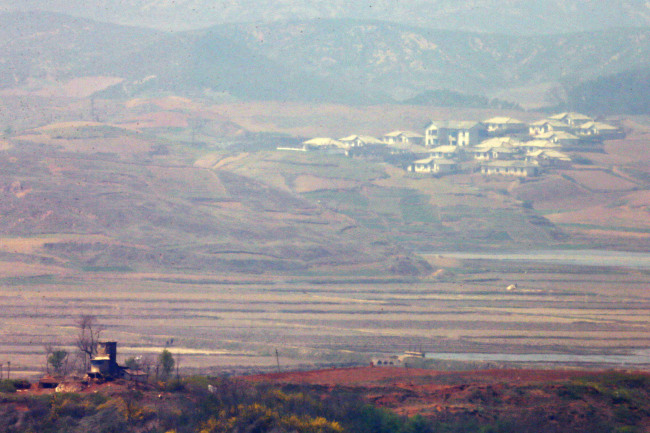Following the opposition camp‘s election sweep, the government is expected to face mounting calls for an overhaul of North Korea and other diplomatic and security policy, as well as a far-reaching Cabinet reshuffle, to include the foreign minister.
Cheong Wa Dae appeared devastated the day after the Wednesday vote, which deprived President Park Geun-hye’s Saenuri Party of not only the majority, but also the largest share of the 300-strong National Assembly, with one official saying, “I can’t figure out where to begin to patch up the situation.”
Having secured a formidable 167 seats in total, the progressive opposition camp vowed to carry through their campaign pledges. The minor opposition People’s Party’s cohead Ahn Cheol-soo on Thursday introduced a plan to install a team tasked with ensuring the implementation of its promises.
Topping their foreign and security agenda is the reopening of the Gaeseong industrial park, shut down in February following North Korea’s nuclear and missile tests, and denuclearization negotiations with Pyongyang.
 |
| A view of North Korea‘s Gaepung-gun, North Hwanghae, seen from the observatory in Paju on Thursday. (Yonhap) |
The main opposition The Minjoo Party of Korea and People’s Party have pledged to restore operations at the complex and restart six-party talks, which also involve the U.S., China, Russia and Japan.
The Minjoo Party also wants to resume inter-Korean business and people-to-people exchange programs, including tours to the Mount Geumgangsan and Mount Baekdusan resorts, Pyongyang and Gaeseong, while the People’s Party envisions setting up a new joint economic zone covering parts of the two Koreas, northeastern China and Russia.
Both parties displayed support for plans to establish the Kill Chain and Korea Air and Missile Defense preemptive strike systems by the early 2020s to shore up the South Korean military’s response capabilities. But the People’s Party opposes the intended stationing of the U.S.’ Terminal High Altitude Area Defense missile system here, citing massive deployment costs relative to its effectiveness and further diplomatic spats with Beijing and Moscow.
Another key issue is the Minjoo Party’s aim to negate and renegotiate a December settlement with Tokyo on the wartime sex slavery issue in light of the stern opposition from surviving victims and their families.
But Foreign Ministry spokesperson Cho June-hyuck said Thursday its commitment to the deal remains unchanged, saying its priority is on the agreement’s enforcement so that the “honor and dignity of the victims will be recovered and the wounds in their hearts healed as swiftly as possible.”
Following the resignation of Saenuri leaders, meanwhile, a sweeping Cabinet shake-up appears to be a must for Cheong Wa Dae to better keep the president’s lame-duck period at bay and kick-start her statecraft, observers say.
The Park administration, in particular, has been accused of attempting to stoke ideological tension by unveiling the joint defection of 13 North Koreans last week in a bid for a political gain ahead of the election, at the expense of its longstanding diplomatic principles of low-profile handling of defector issues.
Among her longest-serving aides is Foreign Minister Yun Byung-se, who has been in the Cabinet since the president was sworn in in February 2013, along with Environment Minister Yoon Seong-kyu.
Yun has since weathered relentless calls for his sacking over frayed Japan ties, the recent sex slavery compromise, Washington’s refusal to hand over fighter jet technologies and other policy mishaps and self-praising remarks that critics say neglected the grave diplomatic and security landscape surrounding the peninsula.
“If not a mass resignation of the Cabinet, an extensive reshuffle would be inescapable in order for the presidential office to revive the momentum for administration, and the longest serving ministers are naturally the first ones to go,” a government official said, requesting anonymity due to the sensitivity of the matter.
An expert at a Seoul-based private think tank said: “Given the collective majority of the opposition parties that stress inter-Korean reconciliation, it would be difficult for the government to anticipate cooperation from the opposition and public support without changing the current North Korea policy centering heavily on sanctions in a way that entails dialogue, as well as an outright personnel reorganization involving foreign, security and unification policymakers.”
By Shin Hyon-hee (heeshin@heraldcorp.com)

